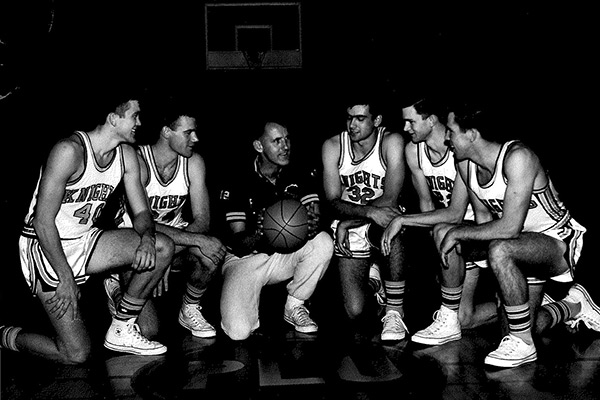Page 242 • (2,441 results in 0.116 seconds)
-
over the world. Eventually, the program will evolve to include about 12 students, Zylstra says. Once it’s fully fleshed out, students will take a class exclusively offered to the TIES group and two classes of their choice at off-campus locations, in addition to an internship or community-based research opportunity. (This year, students are participating in a slightly modified schedule to start.) TACOMA, WASHINGTON This program focuses on community partnerships and advocacy, place-based writing
-
distinctive cultures emerge. 200-Level courses You’ll choose a total of four 200-level courses to taken during your 2nd and 3rd year. These classes are not organized around learning one way of seeing many problems (which is what you do when you take a class in a conventional academic department, like economics, political science, biology, etc.), but which instead use many ways to analyze one theme or problem. IHON 253: Gender, Sexuality, and CultureUses multicultural, international, and feminist
-
majors have commented that they decided to major in math because Rachid spoke to them and encouraged them.” “Dr. Benkhalti is an ideal college professor,” wrote a recent student. “My experience taking classes from him was memorable and makes learning hard mathematical concepts attainable. I learned so much while taking the calculus series, and he motivated me to become a mathematician.” Throughout his 33 years at PLU, Rachid has been involved in a wide variety of leadership and planning committees
-
National Science Foundation. Finney, one of the student researchers, became interested in summer research after taking organic chemistry classes. “I love how (research) is so different from the very structured labs. It’s very free-form,” said Finney, a chemistry major. “You run into so many more problems because it is stuff that is new. As Waldow has said, ‘if research was easy it would have already been done.’” Studying the evolution of fishHeidi Schutz To Heidi Schutz, happiness looks like graphs
-
Rod Pilloud. 1981-1982 A Flea in Her Ear, by Georges Feydeau. Directed by Michael J. Arndt. Dance 1982: Dance Planet. Directed by Professor Maureen McGill. 1980-1981 Dark of the Moon, by Howard Richardson and William Berney. Directed by Professor William Parker. Musical Direction by Professor David Robbins. Choreography by Professor Maureen McGill. Harvey, by Mary Chase. Directed by Visiting Professor Lise Olson. PLU Children’s Theatre Presents: The Lion, the Witch, and the Wardrobe, by C. S
-
years at the helm of Outdoor Rec, the program continued to grow and evolve. During the ’97-98 school year, OR expanded to weeklong trips, one to Montana for skiing and another to Oregon’s Smith Rock for climbing. Wade also began running a basic staff training that discussed risk management in the outdoors, and he held periodic wilderness medicine mini-seminars that addressed what incidents could arise outdoors and how to handle them. “For a lot of us, it was our first foray into real leadership
-

produce sculptural objects using 3D modeling and 3D printing. Or you may choose to explore Design, using cutting-edge software in graphic design classes, as well as working hands-on with our unique collections of letterpress type and ornament. Whatever path you take in the Studio Arts and Design majors, you’ll graduate with the skills needed to make your mark on the world. Concentrations: Art History Studio Arts Ceramics Graphic Design Painting Photography Printmaking Sculpture Graduates from the last
-
class based on critical paper or outside experience. Public reading from creative thesis. Participation in workshops and classes. Graduation. (4) ENGL 511 : Writing Mentorship I One-on-one correspondence with a professional mentor in a genre or genres of choice. Approximately 15 hours of work per week on creative and critical writing. 8 mailings. Emphasis on original work. 24 required texts with approximately 40 pages of critical writing. (4 credits fall, 4 credits spring) ENGL 512 : Writing
-

people about it, they are often surprised. Maybe it isn’t so surprising given what we learned at PLU — the values of a liberal arts education: going to small classes, and knowing our professors. We also learned a lot playing basketball on a team that traveled long hours on buses, playing in a cracker box gym, receiving five dollars for meal money each day, warming up before games to gospel music played on an old pipe organ. These experiences teach you something no class really can: teamwork
-
. The Strolling Players, by Christian Moe and Darwin Payne. Directed by Professor William Parker. Dance 1983: Sundance. Directed by Professor Maureen McGill. The American Clock, by Arthur Miller. Directed by Rod Pilloud. 1981-1982 A Flea in Her Ear, by Georges Feydeau. Directed by Michael J. Arndt. Dance 1982: Dance Planet. Directed by Professor Maureen McGill. 1980-1981 Dark of the Moon, by Howard Richardson and William Berney. Directed by Professor William Parker. Musical Direction by Professor
Do you have any feedback for us? If so, feel free to use our Feedback Form.


